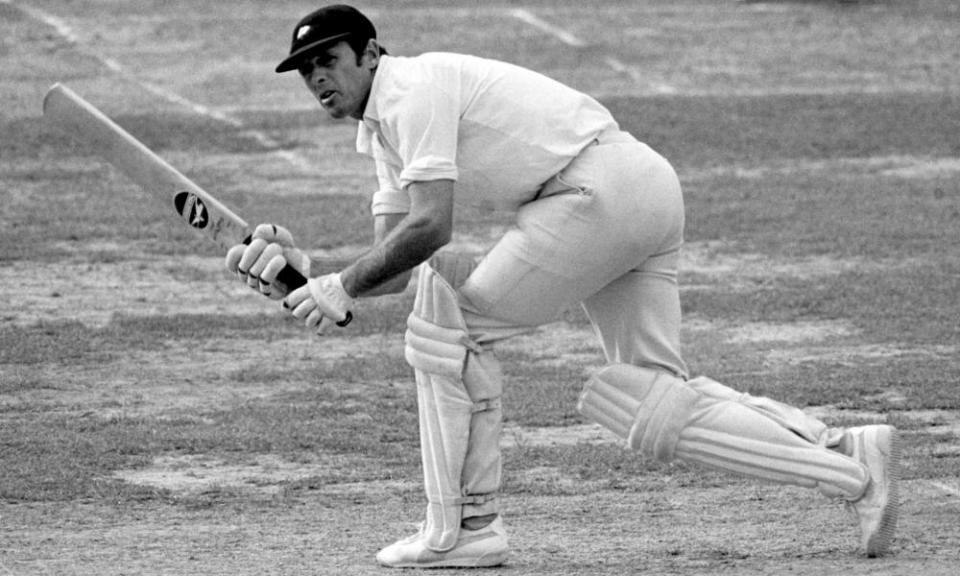Geoffrey Boycott may be vivid and trenchant but he is becoming unbearable | Matthew Engel

On a mid-summer afternoon more than 30 years ago, back in the long-lost era when Yorkshire played a lot more of their cricket away from the dismal confines of Headingley, I was having a happy sunlit wander round the charming old ground at Harrogate.
One man on a bench on the boundary was going on and on to his mate about the usual subject. I paused for a moment to see which way this rather one-way conversation was going to turn when a bloke in the row behind intervened, loudly. “Oh, give it a rest for Christ’s sake!” he shouted. “We’ve all heard enough.”
Had we ever. I can’t remember whether, at that precise moment, Geoffrey Boycott had been sacked, banned, dropped, had walked away, invaded Poland or what. But there was something; there was always something.
Here he was, on the face of it, a dour, technically correct, boring but utterly reliable batsman, a man who any cricket team would welcome: “The unconsidered trellis,” as that great wordsmith Frank Keating once said of Ken Barrington, “around which the public’s favourite fancy-dans and flash Harrys entwined their colourful summer blooms.”
But Boycott was the most obtrusive trellis ever constructed. More talked about than Ian Botham, Andrew Flintoff and Ben Stokes put together. And he still is. Because he hasn’t stopped talking himself.
During the Adelaide Test, Clare Connor, the director of England women’s cricket, sent out an early-morning tweet: “God, the arrogant, all-knowing opinions of Boycott are bordering on unbearable this morning.” Very restrained, some might say, given that she still had space for a dozen or so more adjectives before hitting the Twitter ceiling. But it was Tuesday, England’s good day, and we were all feeling a bit mellow. It was, however, hastily deleted; Connor, unlike Boycott, is not being paid to say what she wants.
It is also more than 30 years since I last saw him bat: he was in Jamaica, just after his retirement, doing newspaper punditry on a Caribbean tour full of strife even without him playing. And he was in his Yorkshire cap blocking his way towards his fifty in what was meant to be a jokey press match. His opening partner then accidentally-on-purpose ran him out to the absolute corpsing delight of every single person present. Bar one.
The very next day Boycott flew to the next leg of the tour, in Trinidad, ahead of the main party. And we were both arrested at the airport, confined under room-arrest in comfy barracks at the Holiday Inn for 24 hours and told we would be deported – ostensibly for not having a work permit; in reality as surrogates for the England party who elements in Trinidadian politics did not want in their country for reasons tangentially connected to South African apartheid.
Well, it was all sorted out. He was good-humoured throughout and we have had a bond ever since: he always greets me as Tweedledum and I am supposed to reply in kind. So, unlike almost everyone else, I have a nuanced view of Boycott. But, honestly, Connor was spot-on. He really is becoming unbearable.
We should, however, pause for a moment to celebrate the singular nature of his gift for commentary. Credit goes to the journalist Tim de Lisle for first noticing how, after they retired, Boycott and Botham swapped roles: the strong-armed slogger turned into a boring blocker; the old blocker started smashing every ball out of the park. As a commentator Boycott is vivid, trenchant and full of character. He has grasped the importance of having his own shtick, in his case a shtick of rhubarb, usually wielded by his granny.
But it is not necessarily good character. Though a great talker, he is a shocking listener. We all get more negative as we get older, and when it comes to cricket the tendency is particularly acute, partly because there are damn good reasons for it. And we probably all get more self-referential too (I’ve chucked three reminiscences into this column already).
Boycott’s commentary, however, comes back over and over to his own performances in the sunny long-ago, which is not the subject under discussion. You could turn it into a form of bingo, like counting the number of “clears” and “clearlys” emanating from the very unclear Boycott-lover Theresa May. Test Match Special boxes are usually very cramped and you can hear the air being sucked out of them when he’s on, especially when he’s partnered with one of the newer bods.
Let me be very clear, as the PM rarely is. Boycott was a remarkable batsman who made an amazing career out of relatively limited natural gifts. But he had great difficulty understanding how his personal performance tied in with the aims of the collective, was a permanent pain in the arse in dressing rooms, and a dreadful captain. There are many anecdotes to support all this; I still chuckle about “Abbeydale back”, the mysterious injury that seemed to beset him before games on the pacy pitch at Abbeydale Park in Sheffield, especially if the opposition had a menacing West Indian in the attack.
He was a very flawed kind of genius. Yet in this particular Ashes, when he is on both TV and radio, he has an unhealthy control of the entire narrative of the series as far as the UK audience is concerned. There is one possible advantage of this to the miniscule minority of the population able to watch BT Sport through these cold night and grey mornings. He can’t be on both TV or radio at once (or can he?). So once you hear him on one, it should be possible to switch to the other.
I still have a certain fondness for the old so-and-so but, like that bloke at Harrogate years ago, I think we’ve all heard enough.

